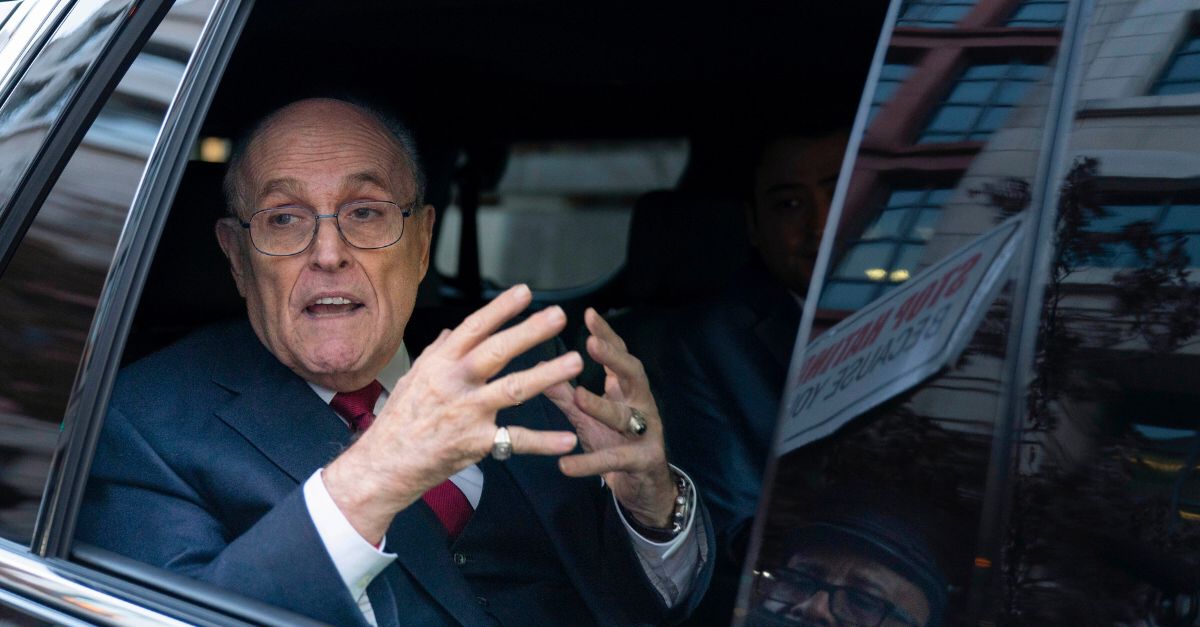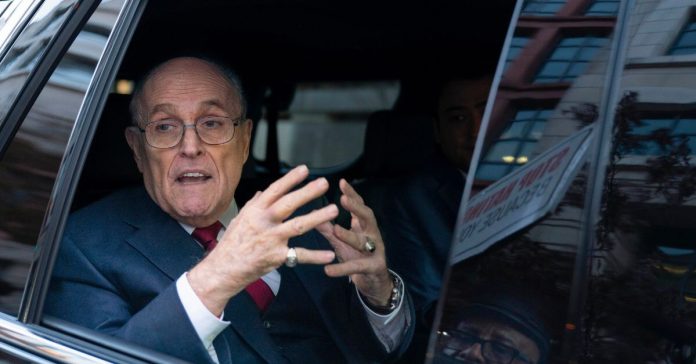
Former Mayor of New York Rudy Giuliani talks to reporters as he leaves after his defamation trial in Washington, Friday, Dec. 15, 2023. A jury awarded $148 million in damages on Friday to two former Georgia election workers who sued Giuliani for defamation over lies he spread about them in 2020 that upended their lives with racist threats and harassment. (AP Photo/Jose Luis Magana, File)
Without mincing words over her concerns on whether Rudy Giuliani will make good on the $148 million a jury found he must pay to two election workers he defamed, a federal judge on Wednesday directed the former mayor and onetime attorney to Donald Trump to fork over the sum “immediately.”
“As the court is aware, Defendant Giuliani has already proven himself to be an unwilling and uncooperative litigant, including with respect to this court’s orders to pay attorneys fees and costs,” U.S. District Judge Beryl Howell wrote in the 13-page order.
It was only last week that an eight-person jury determined the award he would need to pay to former Georgia election workers Ruby Freeman and Shaye Moss.
Giuliani was found liable for defaming the women already, but the weeklong trial was meant to sort out exactly how much he would need to pay. Both of the women testified at the federal courthouse in Washington, D.C., during the trial, though Giuliani did not. Freeman and Moss both explained how his smearing of them with baseless accusations of voter fraud during the 2020 election led to them being terrorized and their good names dragged through the mud. The women lost their jobs, were forced to go into hiding, endured regular threats, many of them racist, and experienced frightening levels of harassment by phone, email and in person. Freeman was forced to flee her home of nearly two decades when supporters of Donald Trump and proponents of the voter fraud conspiracy theories Giuliani shared en masse appeared on her doorstep.
Giuliani seemed undeterred by the jury award and wasted little time repeating accusations of fraud against the women in post-trial appearances in the media including on far-right bloviator Steve Bannon’s podcast.
His insistence prompted Freeman and Moss to sue Giuliani anew.
“Defendant Giuliani’s statements, coupled with his refusal to agree to refrain from continuing to make such statements, make clear that he intends to persist in his campaign of targeted defamation and harassment. It must stop,” lawyers for Freeman and Moss wrote.
In her order, Howell laced into Giuliani for his defiance and pointed to his retention of a spokesperson, Ted Goodman, as one of the reasons why she felt his claims of insolvency were dubious at best.
“Giuliani has made similar representations… that financial difficulties hampered his ability to immediately pay plaintiffs attorney’s fees ordered by this court. Yet Giuliani’s persistent refusal to respond to… discovery requests precluded plaintiffs from testing the veracity of [his] claimed ‘financial difficulties’ and this court’s ability to evaluate his resources to satisfy judgment such that then, as now, [he] has failed to show that he cannot pay the [amount] he owes,” the motion states.
Howell continued: “Such claims of defendant Giuliani’s ‘financial difficulties’ — no matter how many times they are repeated or publicly disseminated and duly reported in the media — are difficult to square with the fact that Giuliani affords a spokesperson who accompanied him daily to trial.”
Giuliani’s lawyer Joseph Sibley argued at trial that the $43 million Freeman and Moss sought would equate to a “civil death penalty” for him given claims of the former New York City mayor’s dire financial straits and mounting legal troubles.
To enforce the judgment, Freeman and Moss by law must wait 30 days before they can attempt seizure of his assets.
In the order, Howell noted that Giuliani has properties in New York and Florida and also holds multiple bank accounts.
When Freeman and Moss sued Giuliani again following the jury award, Giuliani responded with a motion that Howell dismissed as unpersuasive.
In the filing, Giuliani argued he had no intention of “absconding” with the award or hiding his assets.
If he was going to do that, his attorney wrote, he had “ample time to do it” already.
Goodman, Giuliani’s spokesman provided a statement to Law&Crime in an email Thursday as it went public that Giuliani had filed for bankruptcy.
Per Reuters, Giuliani said he had between $100 million and $500 million in liabilities and $1 million to $10 million in assets. He also owes millions in legal fees.
“The filing should be a surprise to no one. No person could have reasonably believed that Mayor Rudy Giuliani would be able to pay such a high punitive amount. Chapter 11 will afford Mayor Giuliani the opportunity and time to pursue an appeal, while providing transparency for his finances under the supervision of the bankruptcy court, to ensure all creditors are treated equally and fairly throughout the process,” Goodman said.
When Law&Crime asked Goodman whether or not he was still being paid by Giuliani as a spokesperson in light of Howell’s ruling, Goodman replied via email: “My work with the mayor isn’t contingent on a paycheck. Mayor Giuliani has earned the right to a vigorous defense and I’m proud to stand alongside this great American hero.”
When Law&Crime followed up again and asked if he was still receiving a paycheck from Giuliani at this time, Goodman responded that he has “never” referred to himself as a spokesman and that he first “started” with Giuliani from “America’s Mayor Live.”
Goodman has been referred to as a political advisor in the press, as well as a a spokesman. Law&Crime asked Goodman Thursday what he considered his official title to be. He did not immediately respond to an inquiry over whether any work he has done for Giuliani including answering or sending emails, answering or sending phone calls or attempting to arrange interviews with journalists is compensated.
Important to note: civil defamation damages cannot be discharged in bankruptcy.
Have a tip we should know? [email protected]

